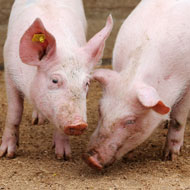Study highlights benefits of oregano oil for pig production

The inclusion of oregano oil helped maintain the body condition score of lactating sows.
The benefits of oregano essential oil for lactating sows and their offspring have been shown in new research.
Farming UK reports a study presented by Dr Melanie Le Bon of Nottingham Trent University. In the study, Dr Le Bon analysed the use of a product called Orego-Stim in sows during lactation and the effect it had on the growth of piglets.
Manufactured by Anpario, Orego-Stim is a natural product which contains oregano essential oil and is available in powder or liquid form. The main active ingredients are thymol and carvacrol - two compounds shown to have antioxidant and antimicrobial functions during animal tests.
It is for this reason that the product should be considered for the pig industry, the Nottingham Trent University researchers found.
Paper co-author Heidi Hall, also Anpario’s Swine Global Technical manager, said, “There is increasing pressure on the pig industry to reduce antimicrobial usage whilst maximising animal health and performance. Therefore, identifying sustainable alternatives is of growing interest”.
In the study, researchers analysed the effect of oregano oil in 62 productive sows and piglets on a commercial pig farm. Performance parameters assessed included sow feed intake and body condition score, alongside piglet weekly weight, mortality, medication useage and creep feed intake.
Researchers said the inclusion of oregano oil helped maintain the body condition score of lactating sows, improved piglet weight gain throughout the first week of life, reduced piglet pre-weaning mortality and significantly lowered incidence of medication usage.
Ms Hall continued: “In order to reduce the reliance upon antimicrobials at weaning, such as zinc oxide, pig farmers need to be able to produce more robust piglets. The weaning and nursery period is a critical time for developing and enhancing piglet health to ensure long term optimal performance”.



 The latest
The latest